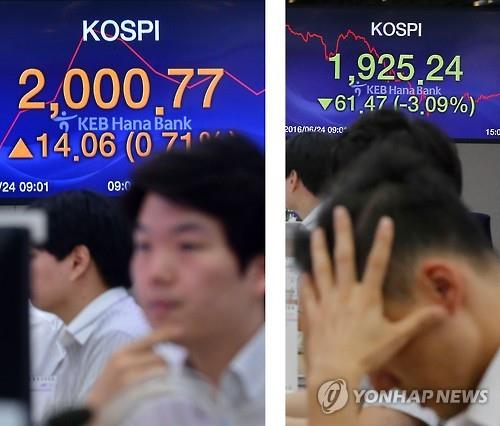- California Assembly OKs highest minimum wage in nation
- S. Korea unveils first graphic cigarette warnings
- US joins with South Korea, Japan in bid to deter North Korea
- LPGA golfer Chun In-gee finally back in action
- S. Korea won’t be top seed in final World Cup qualification round
- US men’s soccer misses 2nd straight Olympics
- US back on track in qualifying with 4-0 win over Guatemala
- High-intensity workout injuries spawn cottage industry
- CDC expands range of Zika mosquitoes into parts of Northeast
- Who knew? ‘The Walking Dead’ is helping families connect
Brexit rocks Seoul’s financial markets
SEOUL, June 24 (Yonhap) — South Korean shares fell by more than 3 percent Friday, the biggest daily loss in over four years, with its currency sinking compared to the U.S. dollar by the greatest amount in five years, bracing for repercussions from Britain’s exit from the European Union (EU).
Bond prices also surged to record highs on expectations that demand for safer assets would rise down the road amid increased market turbulence.
The country’s benchmark Korea Composite Stock Price Index (KOSPI) shed 61.47 points, or 3.09 percent, to 1,925.24 after falling to as low as 1892.75 at one point. As the market nears to a close, institutional investors went on buying some oversold stocks, buttressing up the market.
The Korean won fell 29.70 won, or 2.52 percent, against the greenback to end at 1,179.90 won, marking the steepest daily decline in five years.

In this photo taken on June 24, 2016, in KEB Hana Bank’s dealing room, traders handle foreign exchanges while the Brexit decision roils the local stock and curency markets. (Yonhap)
Analysts expected increased volatility in the domestic stock and currency markets as Britain voted to separate from the EU.
“The Brexit decision will have an impact on the local markets for the rest of the year. There will be a growing demand for further rate cuts, extra spending and stimulus packages to support the economy,” KDB Daewoo Securities Co. analyst Yoon Yeo-sam said.
Hana Financial Investment Co. analyst Kim Yong-gu said investors will pull their money out from emerging markets, including South Korea, to safer assets such as the dollar and the yen.
“There should be close monitoring and immediate reactions by the authorities in case of sharp market volatility,” he said.
The finance ministry, the financial regulator and the central bank held a joint emergency meeting earlier in the day to discuss ways to cope with potential fallout from the Brexit decision, such as capital outflows and financial volatility.
“The government will be ready to take pre-emptive measures to stabilize the markets if excessive and sudden volatility arises,” Financial Services Commission Chairman Yim Jong-yong said.
The main index opened up at 2,001.55 points but turned lower on late Friday morning as early vote results on Britain’s EU membership withdrawal showed a tight race.
Britain’s decision to leave the 28-nation bloc was not widely expected until vote counting started. Polls conducted after the murder of pro-EU lawmaker Jo Cox last week indicated the “remain” camp was ahead of the “leave” camp.
Most large-cap stocks declined across the board.
Market bellwether Samsung Electronics Co. shed 2.10 percent to 1,400,000 won, top carmaker Hyundai Motor Co. fell 1.06 percent to 139,500 won, and state utility Korea Electric Power Corp. declined 1.88 percent to 57,400 won.
Leading steelmaker POSCO slid 5.13 percent to 194,000 won, and top refiner SK Innovation Co. declined 4.48 percent to 138,500 won. No. 1 chemical company LG Chem Ltd. slid down 5.14 percent to 240,000 won.
Foreigners sold a net 145 billion won worth of local stocks, while institutions and individuals bought a combined 88 billion won.
On Friday, the combined market capitalization in the main KOSPI and tech-heavy KOSDAQ markets fell by 47.44 trillion won to 1,420.32 trillion won from a session earlier. It is the biggest drop since Nov. 10, 2011, when the market cap plunged by 57.22 trillion won.
Meanwhile, investors flocked to the safer bond market, sending yields on key Treasurys to record lows amid increased market volatility, which meant bond prices surged to all-time highs.
The yield on three-year Treasurys fell 8.8 basis points to a record low of 1.249 percent and the return on the benchmark five-year government bond shed 10.4 basis points at an all-time low of 1.304 percent.















